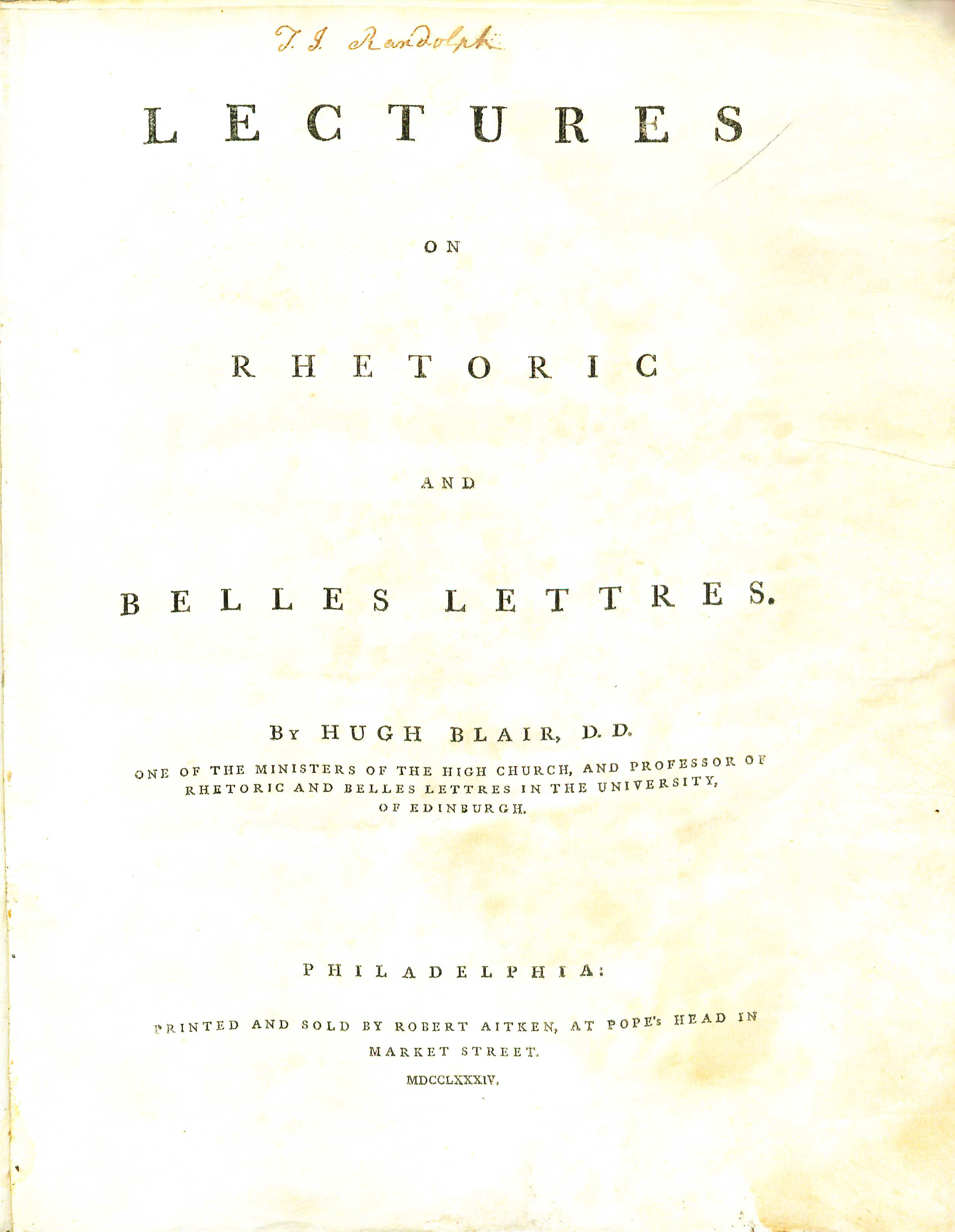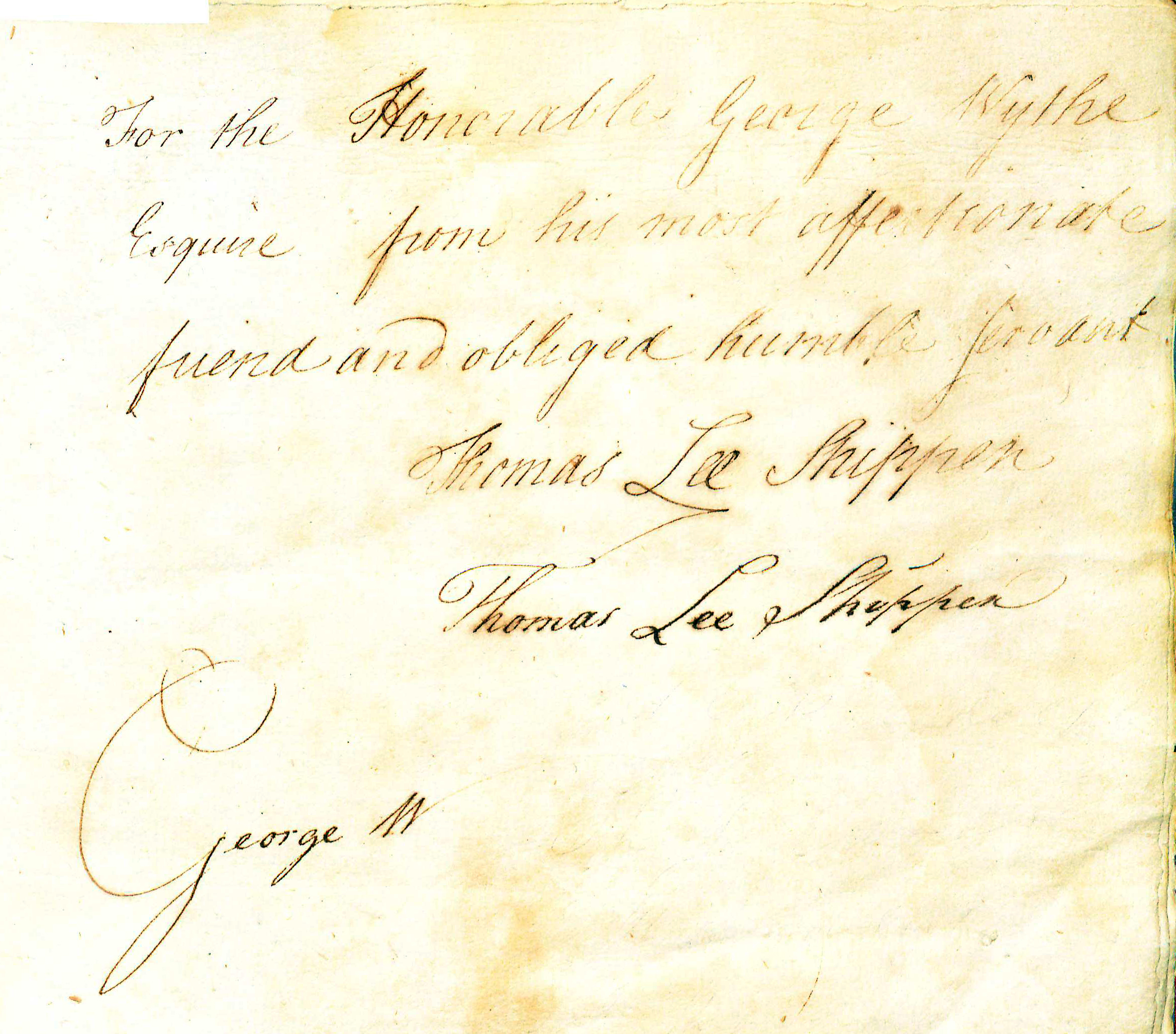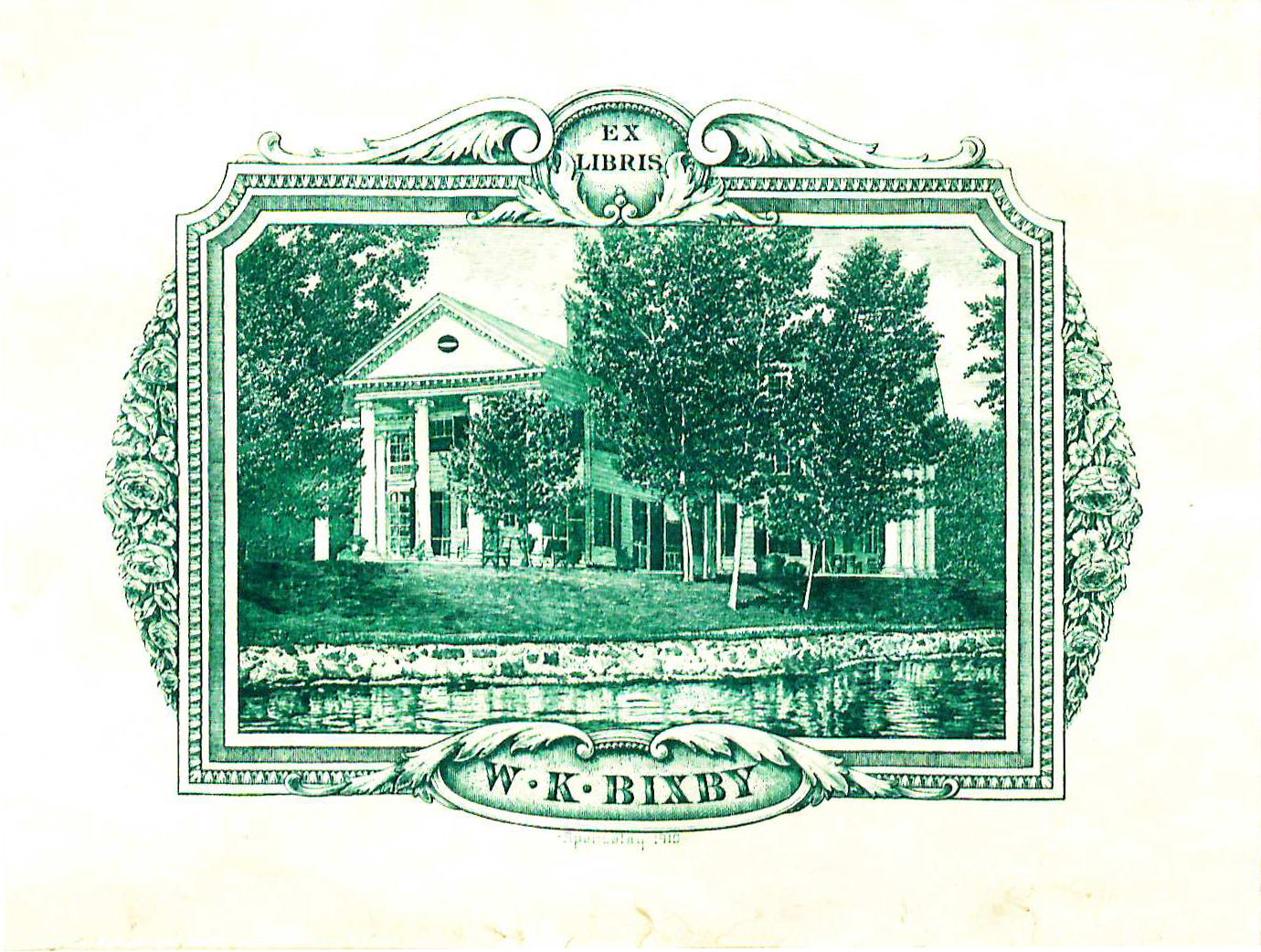Difference between revisions of "Lectures on Rhetoric and Belles Lettres"
(fn edits) |
(Bell e s) |
||
| Line 16: | Line 16: | ||
}}[[File:BlairLecturesOnRhetoric1784Inscription.jpg|left|thumb|300px|<center>Gift inscription to George Wythe, front free endpaper.</center>]][http://en.wikipedia.org/wiki/Hugh_Blair Hugh Blair] (1718-1800) was born in Edinburgh, the only child of a prominent Presbyterian family.<ref>Richard B. Sher, "[http://www.oxforddnb.com/view/article/2563?docPos=1 Blair, Hugh (1718–1800)]" in ''Oxford Dictionary of National Biography'', accessed November 2, 2013. Subsequent biographical information derives from this article.</ref> He entered the [http://en.wikipedia.org/wiki/University_of_Edinburgh University of Edinburgh] at age thirteen where he studied moral philosophy and literature. Two years after finishing his university education, Blair became a Presbyterian preacher. Blair achieved various positions of authority within the Church, and began publishing his largest work, ''Sermons'', during this time. | }}[[File:BlairLecturesOnRhetoric1784Inscription.jpg|left|thumb|300px|<center>Gift inscription to George Wythe, front free endpaper.</center>]][http://en.wikipedia.org/wiki/Hugh_Blair Hugh Blair] (1718-1800) was born in Edinburgh, the only child of a prominent Presbyterian family.<ref>Richard B. Sher, "[http://www.oxforddnb.com/view/article/2563?docPos=1 Blair, Hugh (1718–1800)]" in ''Oxford Dictionary of National Biography'', accessed November 2, 2013. Subsequent biographical information derives from this article.</ref> He entered the [http://en.wikipedia.org/wiki/University_of_Edinburgh University of Edinburgh] at age thirteen where he studied moral philosophy and literature. Two years after finishing his university education, Blair became a Presbyterian preacher. Blair achieved various positions of authority within the Church, and began publishing his largest work, ''Sermons'', during this time. | ||
| − | Beginning in 1760 Blair taught rhetoric and composition at the University of Edinburgh. As he approached retirement, he published many of his lessons in ''Lectures on Rhetoric and Belles Lettres'', perhaps fearful that corrupt manuscripts would circulate. The ''Lectures'' series was first published in 1783 in London, and later that same year in Edinburgh. The publication of ''Lectures on Rhetoric and | + | Beginning in 1760 Blair taught rhetoric and composition at the University of Edinburgh. As he approached retirement, he published many of his lessons in ''Lectures on Rhetoric and Belles Lettres'', perhaps fearful that corrupt manuscripts would circulate. The ''Lectures'' series was first published in 1783 in London, and later that same year in Edinburgh. The publication of ''Lectures on Rhetoric and Belles Lettres'' firmly cemented Blair’s place as a central figure in the [http://en.wikipedia.org/wiki/Scottish_Enlightenment Scottish Enlightenment], and Blair’s ''Sermons'' gained some fame in the United States during the early nineteenth century. |
==Evidence for Inclusion in Wythe's Library== | ==Evidence for Inclusion in Wythe's Library== | ||
Revision as of 09:34, 5 June 2014
by Hugh Blair
| Lectures on Rhetoric and Belles Lettres | |
|
Title page from Lectures on Rhetoric and Belles Lettres, George Wythe Collection, Wolf Law Library, College of William & Mary. | |
| Author | Hugh Blair |
| Published | Philadelphia: Printed and sold by Robert Aitken, at Pope's head in Market street |
| Date | 1784 |
| Edition | First American |
| Language | English |
| Pages | viii, 454, [12] |
| Desc. | 4to (27 cm.) |
Beginning in 1760 Blair taught rhetoric and composition at the University of Edinburgh. As he approached retirement, he published many of his lessons in Lectures on Rhetoric and Belles Lettres, perhaps fearful that corrupt manuscripts would circulate. The Lectures series was first published in 1783 in London, and later that same year in Edinburgh. The publication of Lectures on Rhetoric and Belles Lettres firmly cemented Blair’s place as a central figure in the Scottish Enlightenment, and Blair’s Sermons gained some fame in the United States during the early nineteenth century.
Evidence for Inclusion in Wythe's Library
Wythe definitely owned this title; a copy at the College of William & Mary includes the inscription on the front free endpaper: "For the Honorable George Wythe Esquire from his most affectionate friend and obliged humble servant. Thomas Lee Shippen." Signed "George W" below this. Listed in the Jefferson Inventory of Wythe's Library as "Blair's lectures. 1st. vol. 4to." and given by Thomas Jefferson to his grandson, Thomas Jefferson Randolph. Both Brown's Bibliography[2] and George Wythe's Library[3] on LibraryThing list this title.
Description of the Wolf Law Library's copy
On permanent loan from the Earl Gregg Swem Library at the College of William & Mary. Bound in the original paper boards. A presentation copy, it is inscribed, "For the Honorable George Wythe Esquire from his most affectionate friend and obliged humble servant. Thomas Lee Shippen." Includes signatures of "George W." (on the front free end paper, below the inscription) and "T. J. Randolph" on the title page. The bookplate of W. K. Bixby is on the front pastedown.
View this book in William & Mary's online catalog.
References
- ↑ Richard B. Sher, "Blair, Hugh (1718–1800)" in Oxford Dictionary of National Biography, accessed November 2, 2013. Subsequent biographical information derives from this article.
- ↑ Bennie Brown, "The Library of George Wythe of Williamsburg and Richmond," (unpublished manuscript, May, 2012) Microsoft Word file. Earlier edition available at: https://digitalarchive.wm.edu/handle/10288/13433.
- ↑ LibraryThing, s.v. "Member: George Wythe," accessed on June 28, 2013.


